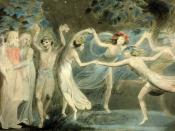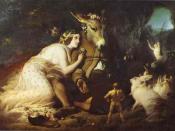Shakespeare wrote 'A Midsummer Night's Dream' for an aristocratic wedding in the gardens of a big country house. The play being performed outside would have made the forest scenes much more believable with the flowers, grassy banks and shrubbery. Women never performed in plays - it was thought an unsuitable job - so female parts were always given to men. This added to the humour, as seen in the film's portrayal of the Mechanicals' performance of 'Pyramus and Thisbe'. Some plays were written purely about aristocratic characters, but Shakespeare made the lower classes have a major role in the play. One reason was that they added some enjoyable comedy to the play, but another was that they completed the picture of social order that was central to Elizabethans.
The play 'A Midsummer Night's Dream' is full of contrast. At the very beginning of the play in Act 1 the first scene is set in Athens.
Here there is much order and restraint. Theseus reflects power and control. He has the authority to make Hermia choose between marrying Demetrius, becoming a nun or death. All scenes in Athens are set in the day, right up until the final performance of the Mechanicals' play in Act 5, scene 1. Law and order is important in Athens and it is obvious that in those times the fathers - in this case, Egeus - had complete control over their daughters.
The forest, in direct contrast, is where the chaos ensues. All the scenes there happen at night and the love juice is always applied when the characters are sleeping. The forest also reflects freedom as there are no apparent rules or laws and everything is at one with nature.
Oberon is a very powerful character, more so, even,


